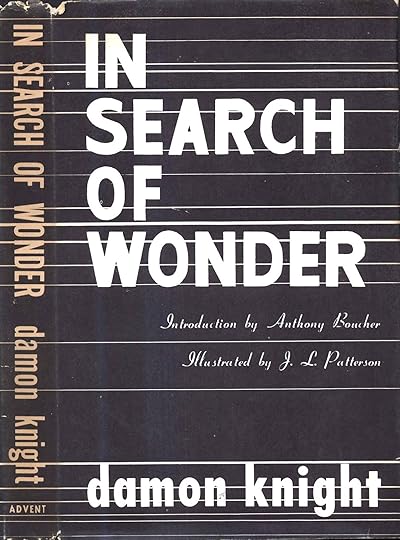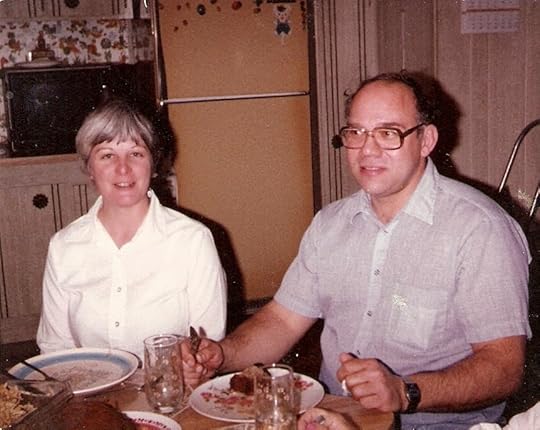Mark Fuller Dillon's Blog, page 44
March 31, 2015
What is a Shaggy Dog Story?
You ask, "What is a shaggy dog story?" and this brings to mind the years I spent as a janitor in a pickle factory. These were extraordinary pickles, the world's largest, cultivated in vats the size of zeppellin sheds and salted by cascades of water the size of Niagara, drawn from the nearby sea. As you can imagine, the combination of salt and pickle matter led to some challenging clean-ups, and in this I was aided by a series of books written by Marceau de Savon, famed cleanser to royalty and hygiene-advisor to the stars. The books were first-rate, as all the reviews testified (even Gore Vidal was impressed), but their great limitation became evident when I failed to discover the word "pickle" in the index. To make a long story short, I was forced to improvise, and eventually learned that the best way to clean up the residue of a pickle factory was to use the leftover dough from the hamburger bun factory next door. But to answer your question -- I've no idea.
Published on March 31, 2015 18:34
March 12, 2015
With Razor Eyes
Sometimes I stare at what I've typed, and wonder how James Blish, Damon Knight, or Joanna Russ would have torn it apart. Then I understand that I can only go forward if I read with razor eyes.


Published on March 12, 2015 20:13
March 9, 2015
To The Darkling Sky By Die-Lon Drive!
Yesterday, the pharmacist called me "Monsieur DIE-Lon."
Her mispronunciation embarrassed her, but I thought it was a great, forceful name. I'm going to scream it out the next time I leap from a skyscraper and soar into the starry welkin.
Her mispronunciation embarrassed her, but I thought it was a great, forceful name. I'm going to scream it out the next time I leap from a skyscraper and soar into the starry welkin.
Published on March 09, 2015 22:46
March 4, 2015
Revision
I love to revise.
Writing a first draft can be like hurtling down a mountainside, on a bike without brakes; but revision is the quiet contemplation of sound, rhythm, and meaning, the calm quest for the right words.
All the same, I can't enjoy a meal before I cook it.
Writing a first draft can be like hurtling down a mountainside, on a bike without brakes; but revision is the quiet contemplation of sound, rhythm, and meaning, the calm quest for the right words.
All the same, I can't enjoy a meal before I cook it.
Published on March 04, 2015 19:12
February 25, 2015
Escape Does Not Work

From "Books," by Joanna Russ, in The Magazine of Fantasy & Science Fiction, November 1979:
It isn't the realists who find life dreadful. It's the romancers. After all, which group is trying to escape from life? Reality is horrible and wonderful, disappointing and ecstatic, beautiful and ugly. Reality is everything. Reality is what there is. Only the hopelessly insensitive find reality so pleasant as to never want to get away from it. But painkillers can be bad for the health, and even if they were not, I am damned if anyone will make me say that the newest fad in analgesics is equivalent to the illumination which is the other thing (besides pleasure) art ought to provide. Bravery, nobility, sublimity, and beauty that have no connection with the real world are simply fake, and once readers realize that escape does not work, the glamor fades, the sublime aristocrats turn silly, the profundities become simplifications, and one enters (if one is lucky) into the dreadful discipline of reality and art, like "The Penal Colony"....
There is no pleasure like finding out the realities of human life, in which joy and misery, effort and release, dread and happiness, walk hand-in-hand.
We had better enjoy it. It's what there is.
Published on February 25, 2015 03:51
February 24, 2015
First-Draft Invocation
Whatever guides the typing, be it Muse,
Or mute subconscious prompter with a sign,
Guide me, now. I swear by every bruise,
By every bump I gained from every pine
That I bashed into head-first in the blues
And greens of hazy dreaming at your news
Of hidden pathways, vague and serpentine,
That I will heed your whispers and your clues,
And (fingers crossed) avoid the asinine.
(And yes, that rhymed couplet in the middle is a deliberate first-draft "mistake." Bumps and bruises!)
Published on February 24, 2015 05:31
February 23, 2015
Wind Chill Minus Thirty-Five
As Venus dogs the Sun into the dark,
The mercury goes down. Every breath
Becomes a puffing battle with a stark,
Inward-seeping augury of death.
But every season hides a poisoned pill,
Where any day could haul us to the brink.
And so I shrug, and linger in the chill,
Just long enough to watch a planet sink.
The mercury goes down. Every breath
Becomes a puffing battle with a stark,
Inward-seeping augury of death.
But every season hides a poisoned pill,
Where any day could haul us to the brink.
And so I shrug, and linger in the chill,
Just long enough to watch a planet sink.
Published on February 23, 2015 18:21
February 18, 2015
The Resonance of Horror
More than most other types of fiction, horror depends for much of its impact on "resonance," on the subconscious connection we feel to the prose, the imagery, the setting, the circumstances of the plot. We can talk about craftsmanship, and for good reason. But when the sun goes down, some stories hit us, others pass by, in large part because they touch, or fail to touch, our nerves.
This can make the impact of certain stories difficult to analyse. Why do they work for us? What is it that reaches out and grabs our subconscious attention?
Recently, for example, I've been trying to understand why a brief, simple and (to be honest) minor story by Charles G. D. Roberts, "The Barn on the Marsh," compells me to read it so often.
I can see technical merit in the story: a clean, economical style, and a central event that is never explained to the reader, even though the narrator does everything he can to explain it to himself. But I can think of many good horror stories that have these merits, which do not compell re-reading. Something else is at work, here: something beyond technique.
How much of the impact, for instance, depends upon personal experience and memory?
When I was a child, I lived for a brief time in Ontario, and I saw many of these Lombardy poplars planted as windbreaks, row on row, beside country houses or barns. They seemed like or green or yellow flames, fragile candles against the harsh weather. They seemed ghost-like, alien.
Again, this reminds me of my own life, much of it having been spent on long, isolated walks by moonlight.
Those who walk alone at night, far away from any house, will understand how easily the mind can be fooled by a glint of starlight, a swaying tree, a shifting thickness of clouds against the moon. This midnight uncertainty is what the story exploits, and quite well. But again, I have to wonder: why have I read this one minor story so often?
Questions like these trouble my stray thoughts, if only because they might underline some of the reasons why certain popular, critically-regarded stories do nothing for me. They might also explain why my own stories are unpopular -- and for that, I have no solution.
This can make the impact of certain stories difficult to analyse. Why do they work for us? What is it that reaches out and grabs our subconscious attention?
Recently, for example, I've been trying to understand why a brief, simple and (to be honest) minor story by Charles G. D. Roberts, "The Barn on the Marsh," compells me to read it so often.
I can see technical merit in the story: a clean, economical style, and a central event that is never explained to the reader, even though the narrator does everything he can to explain it to himself. But I can think of many good horror stories that have these merits, which do not compell re-reading. Something else is at work, here: something beyond technique.
How much of the impact, for instance, depends upon personal experience and memory?
"This road, on either hand, was bordered by a high rail fence, along which rose, here and there, the bleak spire of a ghostly and perishing Lombardy poplar. This is the tree of all least suited to those wind-beaten regions, but none other will the country people plant. Close up to the road, at one point, curved a massive sweep of red dike, and further to the right stretched the miles on miles of naked marsh, till they lost themselves in the lonely, shifting waters of the Basin."
When I was a child, I lived for a brief time in Ontario, and I saw many of these Lombardy poplars planted as windbreaks, row on row, beside country houses or barns. They seemed like or green or yellow flames, fragile candles against the harsh weather. They seemed ghost-like, alien.
"One night, as I started homeward upon the verge of twelve, the marsh seemed all alive with flying gleams. The moon was past the full, white and high; the sky was thick with small black clouds, streaming dizzily across the moon's face, and a moist wind piped steadily in from the sea."
Again, this reminds me of my own life, much of it having been spent on long, isolated walks by moonlight.
Those who walk alone at night, far away from any house, will understand how easily the mind can be fooled by a glint of starlight, a swaying tree, a shifting thickness of clouds against the moon. This midnight uncertainty is what the story exploits, and quite well. But again, I have to wonder: why have I read this one minor story so often?
Questions like these trouble my stray thoughts, if only because they might underline some of the reasons why certain popular, critically-regarded stories do nothing for me. They might also explain why my own stories are unpopular -- and for that, I have no solution.
Published on February 18, 2015 05:25
February 16, 2015
Jacobean Strangeness

Nowadays, I write blank verse in my sleep.
The night before last, I dreamt that I and some strange person (whom I never saw, because I was too intent on the pages) were adapting a non-verse play into verse, with page after page after page of revision.
And just a few hours ago, I dreamt that I was poring through a stack of books, all of them paperback editions of The Duchess of Malfi . I came across one with an attractive cover (scrawly green and brown crayon work on a white background), and the Strange Person tried to convince me that I owned this edition in real life. I said, "No, I don't think so," but he or she or it kept placing the book in my hands.
Speaking of which, I think my obsession is getting out of hand.
Published on February 16, 2015 04:22
February 13, 2015
Fast Food Politics
My father was a quiet, socially-conservative but politically liberal American who became just a bit more quietly radical as the years went by, after we moved to Canada.
Late in his life, while visiting family in the States, he was told that he should take a look at a new fast food restaurant that used animatronic figures to entertain kids.
My father's profession and passion was usability testing to match computer systems to human needs, and so he took a look at this restaurant.
He was appalled.
Later, he said to me, "If that's the fate of computer technology under capitalism, then I'll be a communist."

Late in his life, while visiting family in the States, he was told that he should take a look at a new fast food restaurant that used animatronic figures to entertain kids.
My father's profession and passion was usability testing to match computer systems to human needs, and so he took a look at this restaurant.
He was appalled.
Later, he said to me, "If that's the fate of computer technology under capitalism, then I'll be a communist."

Published on February 13, 2015 18:04



